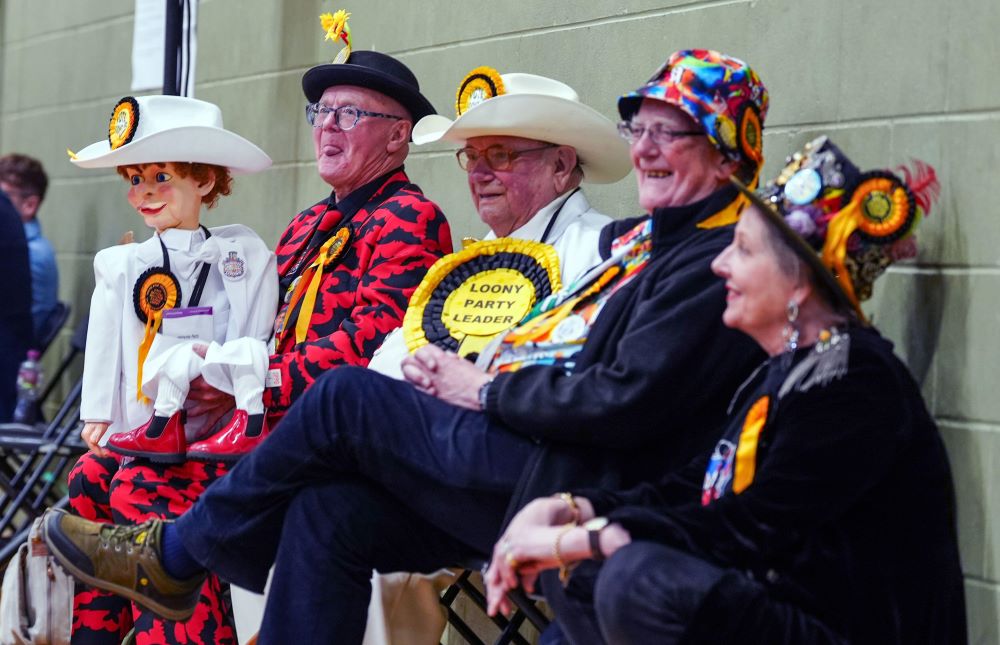A history of fringe candidates
5 min read
There will be a record number of candidates at this election. Many of them will be very serious. But not all.
Long before Count Binface and before even Screaming Lord Sutch, there was the now largely forgotten figure of Lt Commander Bill Boaks.
A thirty-year naval veteran, who saw action at both Dunkirk and against the Bismarck, Boaks fought his first parliamentary election in 1951 in Walthamstow East. It is occasionally claimed that he meant to stand against the prime minister Clement Attlee in Walthamstow West, only to pick the wrong bit of Walthamstow.
He fought his last contest in 1982, when he stood in both the Peckham and Birmingham Northfield by-elections simultaneously. In between, he fought at least 30 others for both Westminster and local government. The precise number varies from source to source and despite being pretty sad we’re not so sad as to count. The one certainty is that he did spectacularly badly in all of them, rarely breaking into three figures.
His high point came in 1974, when he polled 240 votes in Wimbledon. His worst came in 1982, in Glasgow Hillhead: just five votes.
To be fair, in many of these contests he had a relaxed approach to campaigning. He would acquire the requisite number of nominations by walking to the nearest block of council flats (“Just start at the top and work down until you find someone”) and his campaigning was often non-existent. “I never interfere with people’s choices. It’s an intrusion on their privacy."
At the Crosby by-election in 1981 Boaks shared the ballot paper with Tarquin Fin-tim-lin-bin-whin-bim-lim-bus-stop-F'tang-F'tang-Olé-Biscuitbarrel, although the returning officer took the understandable decision to shorten it to Tarquin Biscuitbarrel. Tarquin (original name: John Desmond Dougrez-Lewis) had his origins in a Monty Python spoof on election night coverage (“Arthur Negus has held Bristols - that's not a result, that's a bit of gossip”). In the original sketch Mr Biscuitbarrel won Luton for the Silly Party; in Crosby he lost his deposit, as did Boaks in every contest he took part in.
Deposits were first introduced in the Representation of the People Act 1918 with the specific intention of dissuading what the home secretary at the time referred to as “mere freak candidates”. When first introduced the deposit was set at £150, returnable to any candidate who polled 12.5 per cent of the vote. The original intention was that it had to be the candidate’s own money.
There’s little evidence it worked. During the second world war, the repeated candidacies of Noel Pemberton-Billing – who stood in four by-elections in one year, including once as the “Bomb Berlin” candidate – annoyed Churchill, who complained that the nation “has no time for political privateers who sail from constituency to constituency flying fantastic flags of their own designing”.
By the mid-1980s, after inflation had done its worst, there was again concern that too many fringe candidates were standing. A leader in The Times noted that the system was “in danger of getting out of hand through abuse by the frivolous”. The amount was raised to £500 from 1985, albeit with the vote share required for redemption lowered to 5 per cent.

It did nothing to stem the rise in candidates. Every election since 1997 has seen around 40 per cent or more of those standing fail to hit that 5 per cent target. Given the extent to which the value of the pound has depreciated since 1985 it is if anything slightly surprising that the numbers have not risen even further.
In the late-1990s Jack Straw argued “there are occasions, particularly at parliamentary by-election, where some candidates may not take the electoral process seriously” and proposed raising the amount required, and – crucially – index-linking it, only for the plan to go nowhere. Nor, however, did a proposal by the Electoral Commission to abolish it completely.
It is sometimes said that “fringe” candidates are ahead of their time. Screaming Lord Sutch, for example, was an early supporter of commercial radio, votes at 18, and all-day pub opening. This is true, but up to a point. Boaks’ views on road safety or equal pay for women may well have been ahead of their time, but his views on “male perversion” probably weren’t and he often stood under the appellation Air Road Public Safety White Residents – and even in the 1980s the “White Residents” bit of it caused some stir.
Yet we do need to be careful about making it too difficult to stand. It is difficult to separate out the genuine joke candidates – like, say, the Standing at the Back Dressed Stupidly and Looking Stupid Party, from Blackadder – from those who represent fringe but genuine views. In that Crosby by-election, Mr Biscuitbarrel came not far behind a candidate from the Ecology party, the forerunners of the Greens, who then polled a mere 480 votes – but have now had an MP since 2010 and are standing in almost every constituency.
As A P Herbert – another now largely forgotten figure, but once one of the most famous independent MPs – argued in 1948: “No one has yet defined a 'mere freak'; but in a free country even freaks should be permitted to 'have a go', and it is no bad thing if from time to time an “extraordinary person” gets into the House of Commons."
